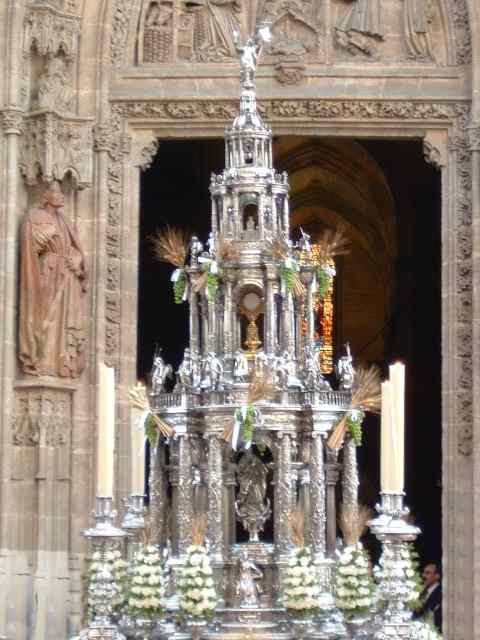POPE FRANCIS HOMILY REFLECTION ON CORPUS CHRISTI.
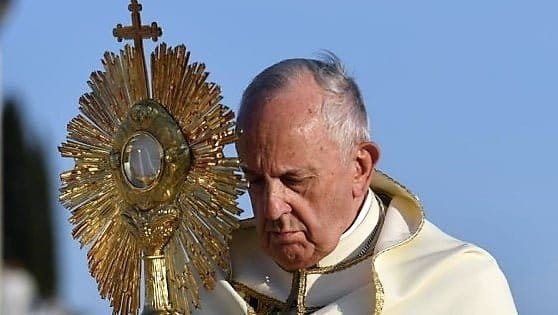
Dear brethren in Christ, below you have a series of homilies given by Pope Francis on the Solemnity of the Most Holy Body and Blood of Christ (“Corpus Christi”) from 2016-2022 for your personal reading and meditation in preparation for the Solemnity of God’s Love for us in the Holy Eucharist.
ANGELUS
Saint Peter’s Square
Sunday, 19 June 2022
_________________________________
Dear brothers and sisters, buongiorno and blessed Sunday!
Today in Italy and in other countries, the Solemnity of the Most Holy Body and Blood of Christ is celebrated. Instituted during the Last Supper, the Eucharist was like the destination of a journey along which Jesus had prefigured it through several signs, above all the multiplication of the loaves narrated in the Gospel of today’s Liturgy (cf. Lk. 9:11b-17). Jesus takes care of the huge crowd that had followed him to listen to his word and to be freed from various evils. He blesses five loaves and two fish, breaks them, the disciples distribute them, and “they all ate and were satisfied” (Lk. 9:17), the Gospel says. In the Eucharist, everyone can experience this loving and concrete attention of the Lord. Those who receive the Body and Blood of Christ with faith not only eat, but are satisfied. To eat and to be satisfied: these are two basic necessities that are satisfied in the Eucharist.
To eat. “They all ate”, writes Saint Luke. As evening fell, the disciples council Jesus to dismiss the crowd so they can go in search of food. But the Teacher wants to provide for that too – he also wants to feed those who had listened to him. The miracle of the loaves and fish does not happen in a spectacular way, but almost secretly, like the wedding at Cana – the bread increases as it passes from hand to hand. And as the crowd eats, they realize that Jesus is taking care of everything. This is the Lord present in the Eucharist. He calls us to be citizens of Heaven, but at the same time he takes into account the journey we have to face here on earth. If I have hardly any bread in my sack, He knows and takes care of it himself.
Sometimes there is the risk of confining the Eucharist to a vague, distant dimension, perhaps bright and perfumed with incense, but rather distant from the straits of everyday life. In reality, the Lord takes all our needs to heart, beginning with the most basic. And he wants to give an example to his disciples, saying, “You give them something to eat” (v. 13), to those people whom he had listened to during the day. We can evaluate our Eucharistic adoration when we take care of our neighbour like Jesus does. There is hunger for food around us, but also of companionship; there is hunger for consolation, friendship, good humour; there is hunger for attention, there is hunger to be evangelized. We find this in the Eucharistic Bread – the attention of Christ to our needs and the invitation to do the same toward those who are beside us. We need to eat and feed others.
In addition to eating, however, we cannot forget being satisfied. The crowd is satisfied because of the abundance of food and also because of the joy and amazement of having received it from Jesus! We certainly need to nourish ourselves, but we also need to be satisfied, to know that the nourishment is given to us out of love. In the Body and Blood of Christ, we find his presence, his life given for each of us. He not only gives us help to go forward, but he gives us himself – he makes himself our traveling companion, he enters into our affairs, he visits us when we are lonely, giving us back a sense of enthusiasm. This satisfies us, when the Lord gives meaning to our life, our obscurities, our doubts; he sees the meaning, and this meaning that the Lord gives satisfies us. This gives us that “more” that everyone is looking for – namely, the presence of the Lord! For in the warmth of his presence, our lives change. Without him, everything would truly be grey. Adoring the Body and Blood of Christ, let us ask him with our heart: “Lord, give me that daily bread to go forward, Lord, satisfy me with your presence!”
May the Virgin Mary teach us how to adore Jesus, living in the Eucharist and to share him with our brothers and sisters.
Source: https://www.vatican.va/content/francesco/en/angelus/2022/documents/20220619-angelus.html
Emphasis mine.
POPE FRANCIS 2021 REFLECTION ON CORPUS CHRISTI.
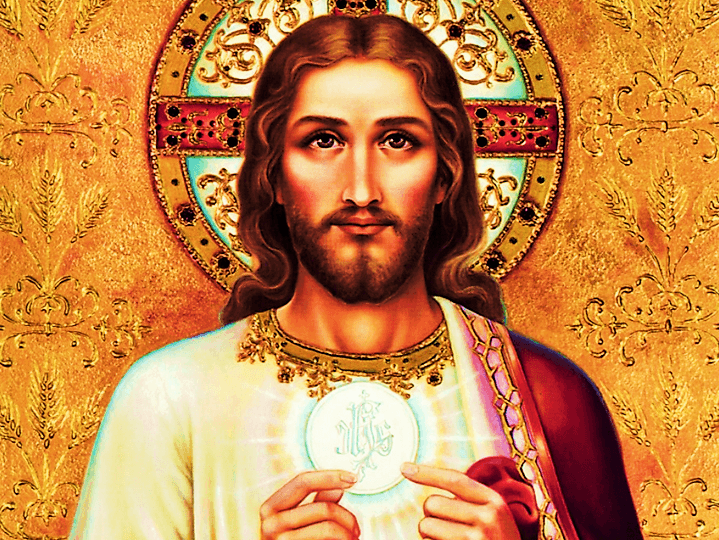
ANGELUS
Sunday, 6 June 2021
Dear Brothers and Sisters, Buongiorno!
Today, in Italy and in other countries, we celebrate the Solemnity of the Body and Blood of Christ. The Gospel presents us the narrative of the Last Supper (Mk 14:12-16, 22-26). The words and gestures of the Lord touch our hearts: He takes the bread in his hands, pronounces the blessing, breaks it and offers it to the disciples, saying: “Take; this is my body” (v. 22).
And thus, with simplicity, Jesus gives us the greatest sacrament. His is a humble gesture of giving, a gesture of sharing. At the culmination of his life, he does not distribute an abundance of bread to feed the multitudes, but he splits himself apart at the Passover supper with the disciples. In this way Jesus shows us that the aim of life lies in self-giving, that the greatest thing is to serve. And today once more we find the greatness of God in a piece of Bread, in a fragility that overflows with love, overflows with sharing. Fragility is precisely the word I would like to underscore. Jesus becomes fragile like the bread that is broken and crumbled. But his strength lies precisely therein, in his fragility. In the Eucharist fragility is strength: the strength of the love that becomes small so it can be welcomed and not feared; the strength of the love that is broken and shared so as to nourish and give life; the strength of the love that is split apart so as to join us in unity.
And there is another strength that stands out in the fragility of the Eucharist: the strength to love those who make mistakes. It is on the night he is betrayed that Jesus gives us the Bread of Life. He gives us the greatest gift while in his heart he feels the deepest abyss: the disciple who eats with Him, who dips the morsel in the same plate, is betraying Him. And betrayal is the worst suffering for one who loves. And what does Jesus do? He reacts to the evil with a greater good. He responds to Judas’ ‘no’ with the ‘yes’ of mercy. He does not punish the sinner, but rather gives His life for him; He pays for him. When we receive the Eucharist, Jesus does the same with us: he knows us; he knows we are sinners; he knows we make many mistakes, but he does not give up on joining his life to ours. He knows that we need it, because the Eucharist is not the reward of saints, but the Bread of sinners. This is why he exhorts us: “Do not be afraid! Take and eat”.
Each time we receive the Bread of Life, Jesus comes to give new meaning to our fragilities. He reminds us that in his eyes we are more precious than we think. He tells us he is pleased if we share our fragilities with him. He repeats to us that his mercy is not afraid of our miseries. And above all he heals us with love from those fragilities that we cannot heal on our own. What fragilities? Let’s think. That of feeling resentment toward those who have done us harm – we cannot heal from this on our own; that of distancing ourselves from others and closing off within ourselves – we cannot heal from that on our own; that of feeling sorry for ourselves and lamenting without finding peace; from this too, we cannot heal on our own. It is He who heals us with his presence, with is bread, with the Eucharist. The Eucharist is an effective medicine for these closures. The Bread of Life, indeed, heals rigidity and transforms it into docility. The Eucharist heals because it joins with Jesus: it makes us assimilate his way of living, his ability to break himself apart and give himself to brothers and sisters, to respond to evil with good. He gives us the courage to go outside of ourselves and bend down with love toward the fragility of others. As God does with us. This is the logic of the Eucharist: we receive Jesus who loves us and heals our fragilities in order to love others and help them in their fragilities; and this lasts our entire life. Today in the Liturgy of the Hours we prayed a hymn: four verses that are the summary of Jesus’ entire life. And thus they tell us that as Jesus was born, he became our travelling companion in life. Then, at the supper he gave himself as food. Then, on the cross, in his death, he became the price: he paid for us. And now, as he reigns in Heaven he is our reward; we go to seek the One who awaits us [cf. Hymn at Lauds on Corpus Christi, Verbum Supernum Prodiens].
May the Blessed Virgin, in whom God became flesh, help us to embrace with a grateful heart the gift of the Eucharist and to make a gift of our life too. May the Eucharist make us a gift for all others.
SOURCE: https://www.vatican.va/content/francesco/en/angelus/2021/documents/papa-francesco_angelus_20210606.html EMPHASIS MINE.
POPE FRANCIS ON CORPUS CHRISTI 2020:
“DO THIS IN REMEMBRANCE OF ME (1 Cor 11:24).”
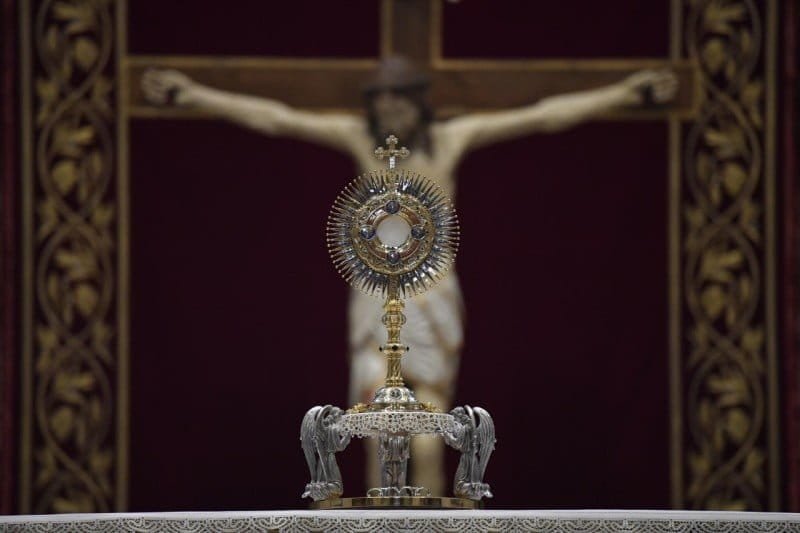
Homily of the Holy Father
on the Solemnity of Corpus Christi, 14.06.2020
“Remember all the way which the Lord your God has led you” (Deut 8:2). Today’s Scripture readings begin with this command of Moses: Remember! Shortly afterwards Moses reiterates: “Do not forget the Lord, your God” (v.14). Scripture has been given to us that we might overcome our forgetfulness of God. How important it is to remember this when we pray! As one of the Psalms teaches: “I will call to mind the deeds of the Lord; yes, I will remember your wonders of old” (77:11). But all those wonders too, that the Lord has worked in our own lives.
It is vital to remember the good we have received. If we do not remember it, we become strangers to ourselves, “passers-by” of existence. Without memory, we uproot ourselves from the soil that nourishes us and allow ourselves to be carried away like leaves in the wind. If we do remember, however, we bind ourselves afresh to the strongest of ties; we feel part of a living history, the living experience of a people. Memory is not something private; it is the path that unites us to God and to others. This is why in the Bible the memory of the Lord must be passed on from generation to generation. Fathers are commanded to tell the story to their sons, as we read in a beautiful passage. “When your son asks you in time to come, ‘What is the meaning of the decrees and the statutes and the ordinances which the Lord our God has commanded you?’, then you shall say to your son, ‘We were slaves… [think of the whole history of slavery!], and the Lord showed signs and wonders… before our eyes’” (Deut 6:20-22). You shall hand down this memory to your son.
But there is a problem: what if the chain of transmission of memories is interrupted? And how can we remember what we have only heard, unless we have also experienced it? God knows how difficult it is, he knows how weak our memory is, and he has done something remarkable: he left us a memorial. He did not just leave us words, for it is easy to forget what we hear. He did not just leave us the Scriptures, for it is easy to forget what we read. He did not just leave us signs, for we can forget even what we see. He gave us Food, for it is not easy to forget something we have actually tasted. He left us Bread in which he is truly present, alive and true, with all the flavour of his love. Receiving him we can say: “He is the Lord; he remembers me!” That is why Jesus told us: “Do this in remembrance of me” (1 Cor 11:24). Do! The Eucharist is not simply an act of remembrance; it is a fact: the Lord’s Passover is made present once again for us. In Mass the death and resurrection of Jesus are set before us. Do this in remembrance of me: come together and celebrate the Eucharist as a community, as a people, as a family, in order to remember me. We cannot do without the Eucharist, for it is God’s memorial. And it heals our wounded memory.
The Eucharist first heals our orphaned memory. We are living at a time of great orphanage. The Eucharist heals orphaned memory. So many people have memories marked by a lack of affection and bitter disappointments caused by those who should have given them love and instead orphaned their hearts. We would like to go back and change the past, but we cannot. God, however, can heal these wounds by placing within our memory a greater love: his own love. The Eucharist brings us the Father’s faithful love, which heals our sense of being orphans. It gives us Jesus’ love, which transformed a tomb from an end to a beginning, and in the same way can transform our lives. It fills our hearts with the consoling love of the Holy Spirit, who never leaves us alone and always heals our wounds.
Through the Eucharist, the Lord also heals our negative memory, that negativity which seeps so often into our hearts. The Lord heals this negative memory, which drags to the surface things that have gone wrong and leaves us with the sorry notion that we are useless, that we only make mistakes, that we are ourselves a mistake. Jesus comes to tell us that this is not so. He wants to be close to us. Every time we receive him, he reminds us that we are precious, that we are guests he has invited to his banquet, friends with whom he wants to dine. And not only because he is generous, but because he is truly in love with us. He sees and loves the beauty and goodness that we are. The Lord knows that evil and sins do not define us; they are diseases, infections. And he comes to heal them with the Eucharist, which contains the antibodies to our negative memory. With Jesus, we can become immune to sadness. We will always remember our failures, troubles, problems at home and at work, our unrealised dreams. But their weight will not crush us because Jesus is present even more deeply, encouraging us with his love. This is the strength of the Eucharist, which transforms us into bringers of God, bringers of joy, not negativity. We who go to Mass can ask: What is it that we bring to the world? Is it our sadness and bitterness, or the joy of the Lord? Do we receive Holy Communion and then carry on complaining, criticising and feeling sorry for ourselves? This does not improve anything, whereas the joy of the Lord can change lives.
Finally, the Eucharist heals our closed memory. The wounds we keep inside create problems not only for us, but also for others. They make us fearful and suspicious. We start with being closed, and end up cynical and indifferent. Our wounds can lead us to react to others with detachment and arrogance, in the illusion that in this way we can control situations. Yet that is indeed an illusion, for only love can heal fear at its root and free us from the self-centredness that imprisons us. And that is what Jesus does. He approaches us gently, in the disarming simplicity of the Host. He comes as Bread broken in order to break open the shells of our selfishness. He gives of himself in order to teach us that only by opening our hearts can we be set free from our interior barriers, from the paralysis of the heart.
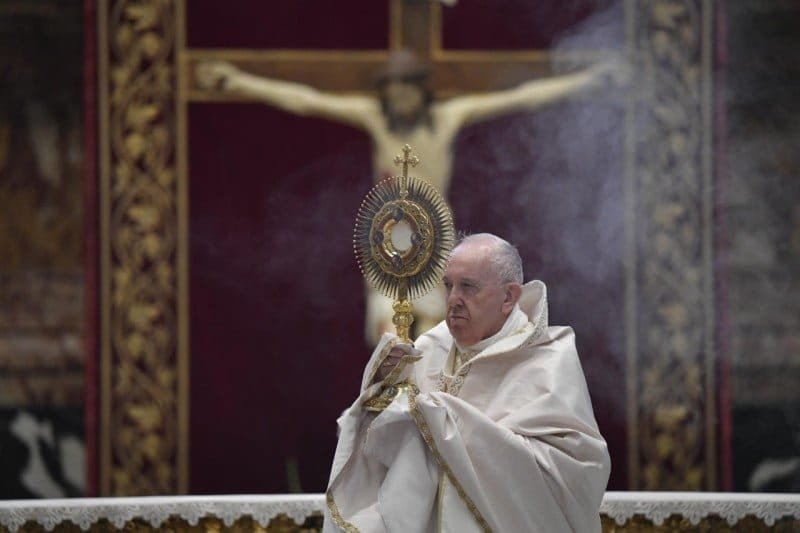
The Lord, offering himself to us in the simplicity of bread, also invites us not to waste our lives in chasing the myriad illusions that we think we cannot do without, yet that leave us empty within. The Eucharist satisfies our hunger for material things and kindles our desire to serve. It raises us from our comfortable and lazy lifestyle and reminds us that we are not only mouths to be fed, but also his hands, to be used to help feed others. It is especially urgent now to take care of those who hunger for food and for dignity, of those without work and those who struggle to carry on. And this we must do in a real way, as real as the Bread that Jesus gives us. Genuine closeness is needed, as are true bonds of solidarity. In the Eucharist, Jesus draws close to us: let us not turn away from those around us!
Dear brothers and sisters, let us continue our celebration of Holy Mass: the Memorial that heals our memory. Let us never forget: the Mass is the Memorial that heals memory, the memory of the heart. The Mass is the treasure that should be foremost both in the Church and in our lives. And let us also rediscover Eucharistic adoration, which continues the work of the Mass within us. This will do us much good, for it heals us within. Especially now, when our need is so great.
The Pope’s Words at the Angelus prayer, 14.06.2020
Before the Angelus
Dear Brothers and Sisters, good day!
Today, in Italy and in other nations, the Solemnity of the Body and Blood of Christ, Corpus Christi, is celebrated. In the second Reading of today’s liturgy, Saint Paul describes the Eucharistic celebration (see 1 Cor 10:16-17). He highlights two effects of the shared chalice and the broken bread: the mystical effect and the communal effect.
First, the Apostle states that: “The cup of blessing that we bless, is it not a participation in the blood of Christ? The bread that we break, is it not a participation in the body of Christ?” (v. 16). These words express the mystical, or let us say, spiritual effect of the Eucharist: it relates to the union with Christ, who in the bread and the wine offers Himself for the salvation of all. Jesus is present in the sacrament of the Eucharist to be our nourishment, to be assimilated and to become in us that renewing force that gives once again the energy and the desire to set out again after every pause or after every fall. But this requires our assent, our willingness to let ourselves be transformed – our way of thinking and acting. Otherwise the Eucharistic celebrations in which we participate are reduced to empty and formal rites. And many times, someone goes to Mass because they have to go, as if it is a social event, respectful but social. But the mystery is something else. It is Jesus who is present, who comes to nourish us.
The second effect is the communal one and is expressed by Saint Paul in these words: “Because the loaf of bread is one, we, though many, are one body” (v. 17). It is the mutual communion of those who participate in the Eucharist, to the point of becoming one body together, in the same way that one loaf is broken and distributed. We are a community, nourished by the body and blood of Christ. Communion with the body of Christ is an effective sign of unity, of communion, of sharing. One cannot participate in the Eucharist without committing oneself to mutual fraternity – that it be sincere. But the Lord knows well that our human strength alone is not enough for this. On the contrary, He knows that there will always be the temptation of rivalry, envy, prejudice, division … among His disciples. We are all aware of all these things. For this reason too He left us the Sacrament of His real, tangible and permanent Presence, so that, remaining united to Him, we may always receive the gift of fraternal love. “Remain in my love” (Jn 15:9), Jesus said. And it is possible thanks to the Eucharist. Remain in friendship, in love.
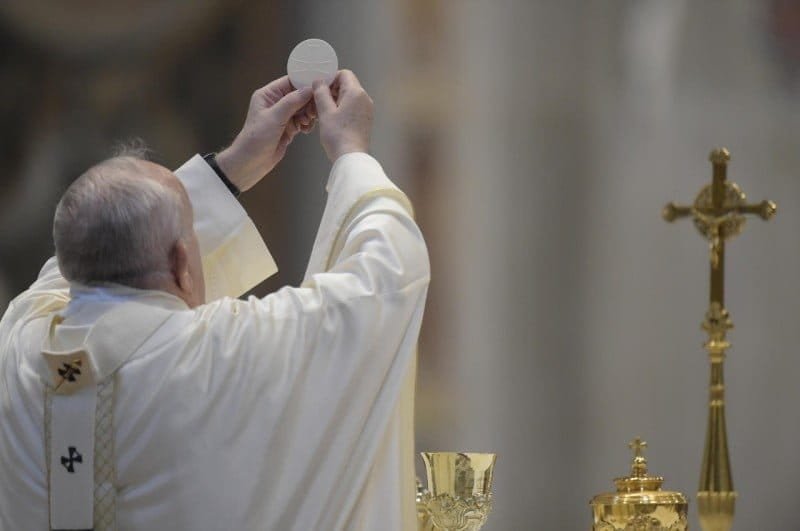
This dual fruit of the Eucharist: first, union with Christ and second, communion between those who are nourished by Him, generates and continually renews the Christian community. It is the Church that makes the Eucharist, but it is more fundamental that the Eucharist makes the Church, and allows her to be her mission, even before she accomplishes it. This is the mystery of communion, of the Eucharist: to receive Jesus so He might transform us from within and to receive Jesus so that in Him we might be united, not divided.
May the Blessed Virgin help us to always welcome with wonder and gratitude the great gift that Jesus gave us by leaving us the Sacrament of His Body and His Blood.
SOURCE: VATICAN.VA
EMPHASIS MINE.
THE EUCHARIST:
A SCHOOL OF BLESSING AND SELF-GIVING
Church of Santa Maria Consolatrice, 23 June 2019
Today, God’s word helps us to appreciate more deeply two verbs that are simple, yet essential for daily life: to speak and to give.
To speak. In the first reading, Melchizedek says: “Blessed be Abram by God Most High… and blessed be God Most High” (Gen 14:19-20). For Melchizedek, to speak is to bless. He blesses Abraham, in whom all the families of the earth will be blessed (cf. Gen 12:3; Gal 3:8). Everything begins with blessing: words of goodness create a history of goodness. The same thing happens in the Gospel: before multiplying the loaves, Jesus blesses them: “Taking the five loaves, he looked up to heaven and blessed and broke them, and gave them to the disciples” (Lk 9:16). A blessing turns five loaves into food enough for a great crowd: the blessing releases a cascade of goodness.
Why is it good to bless? Because it turns a word into a gift. When we bless, we are not doing something for ourselves, but for others. Blessing is not about saying nice words or trite phrases. No, it is about speaking goodness, speaking with love. That is what Melchizedek did, when he spontaneously blessed Abram, who had not said or done anything for him. Jesus did the same thing, and he showed what the blessing meant by freely distributing the loaves. How many times too, have we been blessed, in church or in our homes? How many times have we received words of encouragement, or a sign of the cross on our forehead? We were blessed on the day of our baptism, and we are blessed at the end of every Mass. The Eucharist is itself a school of blessing. God blesses us, his beloved children, and thus encourages us to keep going. And we, in turn, bless God in our assemblies (cf. Ps 68:26), rediscovering the joy of praise that liberates and heals the heart. We come to Mass, certain that we will be blessed by the Lord, and we leave in order to bless others in turn, to be channels of goodness in the world.
This is also true for us: it is important for us pastors to keep blessing God’s people. Dear priests, do not be afraid to give a blessing, to bless the People of God. Dear priests, continue to bless: the Lord wants to bless his people; he is happy to make us feel his affection for us. Only as those who are themselves blessed, can we in turn bless others with that same anointing of love. It is sad to think of how easily people today do the opposite: they curse, despise and insult others. In the general frenzy, we lose control and vent our rage on everything and everyone. Sadly, those who shout most and loudest, those angriest, often appeal to others and persuade them. Let us avoid being infected by that arrogance; let us not let ourselves be overcome by bitterness, for we eat the Bread that contains all sweetness within it. God’s people love to praise, not complain; we were created to bless, not grumble. In the presence of the Eucharist, Jesus who becomes bread, this simple bread that contains the entire reality of the Church, let us learn to bless all that we have, to praise God, to bless and not curse all that has led us to this moment, and to speak words of encouragement to others.
The second verb is to give. “Speaking” is thus followed by “giving”. This was the case with Abraham who, after being blessed by Melchizedek, “gave him a tenth of everything” (Gen 14:20). It was the case, too, with Jesus who after reciting the blessing, gave the loaves to be distributed among the crowd. This tells us something very beautiful. Bread is not only something to be consumed; it is a means of sharing. Surprisingly, the account of the multiplication of the loaves does not mention the multiplication itself. On the contrary, the words that stand out are: “break”, “give” and “distribute” (cf. Lk 9:16). In effect, the emphasis is not on the multiplication but the act of sharing. This is important. Jesus does not perform a magic trick; he does not change five loaves into five thousand and then to announce: “There! Distribute them!” No. Jesus first prays, then blesses the five loaves and begins to break them, trusting in the Father. And those five loaves never run out. This is no magic trick; it is an act of trust in God and his providence.
In the world, we are always trying to increase our profits, to raise our income. But why? Is it to give, or to have? To share or to accumulate? The “economy” of the Gospel multiplies through sharing, nourishes through distributing. It does not sate the greed of a few, but gives life to the world (cf. Jn 6:33). The verb Jesus uses is not to have but to give.
He tells his disciples straight out: “You give them something to eat” (Lk 9:13). We can imagine the thoughts that went through their minds: “We don’t have enough bread for ourselves, and now we are supposed to think about others? Why do we have to give them something to eat, if they came to hear our Teacher? If they didn’t bring their own food, let them go back home, it’s their problem; or else give us some money to buy food”. This way of thinking is not wrong, but it isn’t the way Jesus thinks. He will have none of it: “You give them something to eat”. Whatever we have can bear fruit if we give it away – that is what Jesus wants to tell us – and it does not matter whether it is great or small. The Lord does great things with our littleness, as he did with the five loaves. He does not work spectacular miracles or wave a magic wand; he works with simple things. God’s omnipotence is lowly, made up of love alone. And love can accomplish great things with little. The Eucharist teaches us this: for there we find God himself contained in a piece of bread. Simple, essential, bread broken and shared, the Eucharist we receive allows us to see things as God does. It inspires us to give ourselves to others. It is the antidote to the mindset that says: “Sorry, that is not my problem”, or: “I have no time, I can’t help you, it’s none of my business”. Or that looks the other way…
In our city that hungers for love and care, that suffers from decay and neglect, that contains so many elderly people living alone, families in difficulty, young people struggling to earn their bread and to realize their dreams, the Lord says to each one of you: “You yourself give them something to eat”. You may answer: “But I have so little; I am not up to such things”. That is not true; your “little” has great value in the eyes of Jesus, provided that you don’t keep it to yourself, but put it in play. Put yourself in play! You are not alone, for you have the Eucharist, bread for the journey, the bread of Jesus. Tonight too, we will be nourished by his body given up for us. If we receive it into our hearts, this bread will release in us the power of love. We will feel blessed and loved, and we will want to bless and love in turn, beginning here, in our city, in the streets where we will process this evening. The Lord comes to our streets in order to speak a blessing for us and to give us courage. And he asks that we too be blessing and gift for others.
THE EUCHARIST IS THE BEATING HEART OF THE CHURCH.
Santa Monica parish in Ostia Sunday, 3 June 2018
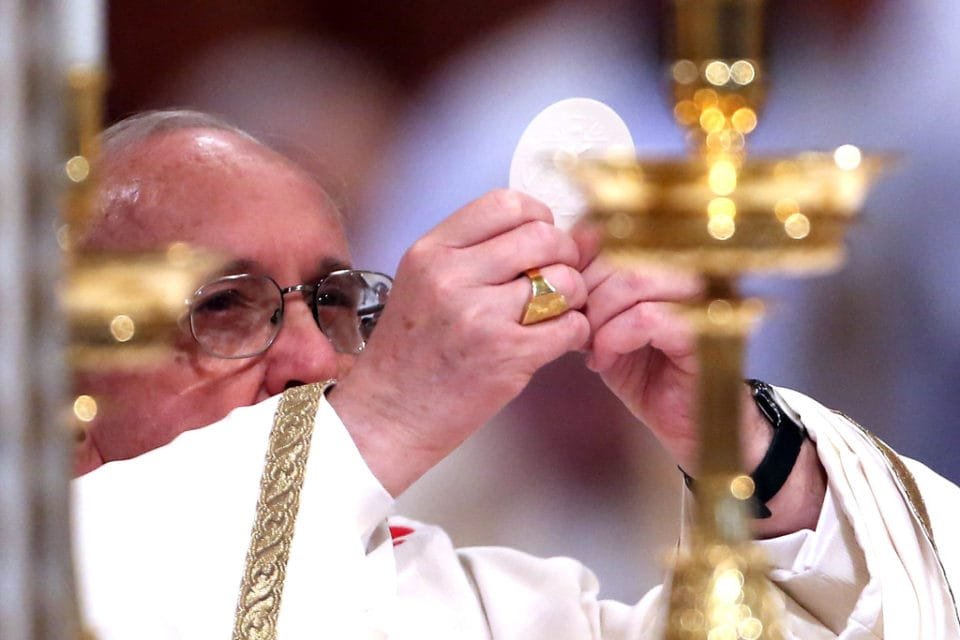
The Gospel we just heard speaks of the Last Supper, but surprisingly, pays more attention to the preparations than to the dinner itself. We keep hearing the word “prepare”. For example, the disciples ask: “Where do you want us to go and prepare for you to eat the Passover?” (Mk 14:12). Jesus sends them off with clear instructions to make the necessary preparations and they find “a large room… furnished and ready” (v. 15). The disciples went off to prepare, but the Lord had already made his own preparations.
Something similar occurs after the resurrection, when Jesus appears to the disciples for the third time. While they are fishing, he waits for them on the shore, where he has already prepared bread and fish for them. Even so, he tells the disciples to bring some of the fish that they have just caught, which he had shown them how to catch (cf. Jn 21:6.9-10). Jesus has already made preparations and he asks his disciples to cooperate. Once again, just before the Passover meal, Jesus tells the disciples: “I go to prepare a place for you… so that where I am, there you may be also” (Jn 14:2.3). Jesus is the one who prepares, yet before his own Passover he also asks us urgently, with exhortations and parables, to be prepared, to remain ever ready (cf. Mt 24:44; Lk 12:40).
Jesus, then, prepares for us and asks us to be prepared. What does Jesus prepare for us? He prepares a place and a meal. A place much more worthy than the “large furnished room” of the Gospel. It is our spacious and vast home here below, the Church, where there is, and must be, room for everyone. But he has also reserved a place for us on high, in heaven, so that we can be with him and with one another for ever. In addition to a place, he prepares a meal, the Bread in which he gives himself: “Take; this is my body” (Mk 14:22). These two gifts, a place and a meal, are what we need to live. They are our ultimate “room and board”. Both are bestowed upon us in the Eucharist. A place and a meal.
Jesus prepares a place for us here below, because the Eucharist is the beating heart of the Church. It gives her birth and rebirth; it gathers her together and gives her strength. But the Eucharist also prepares for us a place on high, in eternity, for it is the Bread of heaven. It comes down from heaven – it is the only matter on earth that savours of eternity. It is the bread of things to come; even now, it grants us a foretaste of a future infinitely greater than all we can hope for or imagine. It is the bread that sates our greatest expectations and feeds our finest dreams. It is, in a word, the pledge of eternal life – not simply a promise but a pledge, a concrete anticipation of what awaits us there. The Eucharist is our “reservation” for the heavenly banquet; it is Jesus himself, as food for our journey towards eternal life and happiness.
In the consecrated host, together with a place, Jesus prepares for us a meal, food for our nourishment. In life, we constantly need to be fed: nourished not only with food, but also with plans and affection, hopes and desires. We hunger to be loved. But the most pleasing compliments, the finest gifts and the most advanced technologies are not enough; they never completely satisfy us. The Eucharist is simple food, like bread, yet it is the only food that satisfies, for there is no greater love. There we encounter Jesus really; we share his life and we feel his love. There you can realize that his death and resurrection are for you. And when you worship Jesus in the Eucharist, you receive from him the Holy Spirit and you find peace and joy. Dear brothers and sisters, let us choose this food of life! Let us make Mass our priority! Let us rediscover Eucharistic adoration in our communities! Let us implore the grace to hunger for God, with an insatiable desire to receive what he has prepared for us.
As he did with his disciples, so too today Jesus asks us, today, to prepare. Like the disciples, let us ask him: “Lord, where do you want us to go to prepare?” Where: Jesus does not prefer exclusive, selective places. He looks for places untouched by love, untouched by hope. Those uncomfortable places are where he wants to go and he asks us to prepare his way. How many persons lack dignified housing or food to eat! All of us know people who are lonely, troubled and in need: they are abandoned tabernacles. We, who receive from Jesus our own room and board, are here to prepare a place and a meal for these, our brothers and sisters in need. Jesus became bread broken for our sake; in turn, he asks us to give ourselves to others, to live no longer for ourselves but for one another. In this way, we live “eucharistically”, pouring out upon the world the love we draw from the Lord’s flesh. The Eucharist is translated into life when we pass beyond ourselves to those all around us.
The Gospel tells us that the disciples prepared for the meal after they “set out and went to the city” (v. 16). The Lord calls us also today to prepare for his coming not by keeping our distance but by entering our cities. That includes this city, whose very name – Ostia – means entrance, doorway. Lord, how many doors do you want us to open for you here? How many gates do you call us to unbar, how many walls must we tear down? Jesus wants the walls of indifference and silent collusion to be breached, iron bars of oppression and arrogance torn asunder, and paths cleared for justice, civility and legality. The vast beachfront of this city speaks to us of how beautiful it is to open our hearts and to set out in new directions in life. But this requires loosening the knots that keep us bound to the moorings of fear and depression. The Eucharist invites to let ourselves be carried along by the wave of Jesus, to not remain grounded on the beach in the hope that something may come along, but to cast into the deep, free, courageous and united.
The Gospel ends by telling us that the disciples, “after singing a hymn, went out” (v. 26). At the end of Mass, we too will go out; we will go forth with Jesus, who will pass through the streets of this city. Jesus wants to dwell among you. He wants to be part of your lives, to enter your houses and to offer his liberating mercy, his blessing and his consolation. You have experienced painful situations; the Lord wants to be close to you. Let us open our doors to him and say:
Come, Lord, and visit us.
We welcome you into our hearts,
our families and our city.
We thank you because you have prepared for us
the food of life and a place in your Kingdom.
Make us active in preparing your way,
joyous in bringing you, who are life, to others,
and thus to bring fraternity, justice and peace
to our streets. Amen.
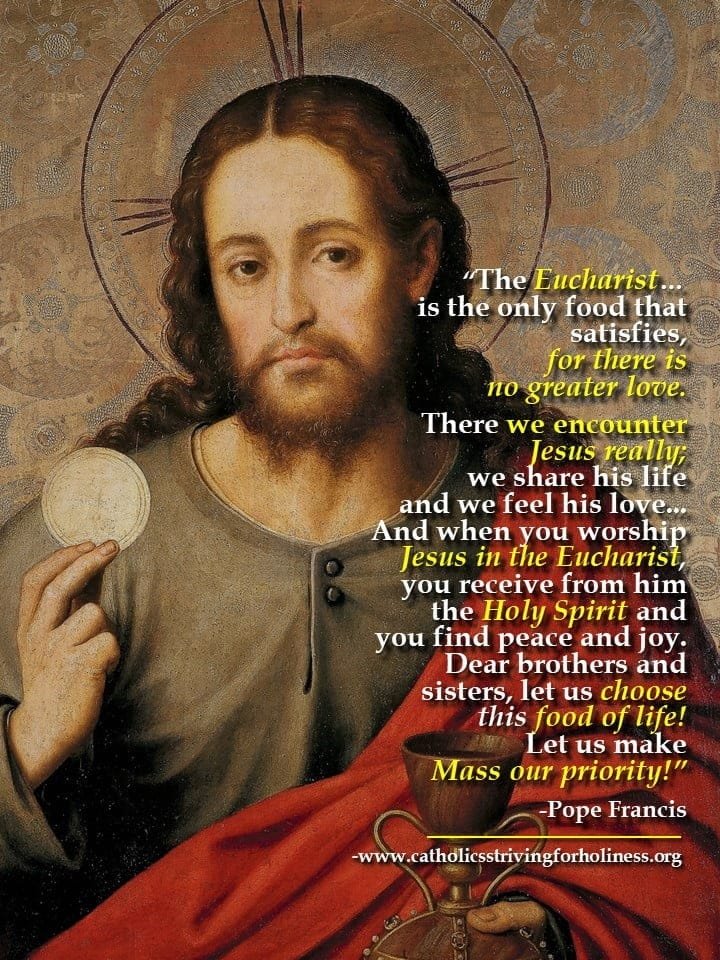
THE EUCHARIST, MEMORIAL OF GOD’S LOVE, SACRAMENT OF GOD’S UNITY.
Saint John Lateran Square, 18 June 2017
On this Solemnity of Corpus Domini, the idea of memory comes up again and again. Moses says to the people: “You shall remember all the way which the Lord your God has led you…. Lest… you forget the Lord your God, who fed you in the wilderness with manna” (Dt 8:2, 14, 16). Jesus will tell us: “Do this in memory of me” (1 Cor 11:24). Saint Paul will tell his disciple: “Remember Jesus Christ” (2 Tim 2:8). The “living bread, come down from heaven” (Jn 6:51) is the sacrament of memory, reminding us, in a real and tangible way, of the story of God’s love for us.
Today, to each of us, the word of God says, Remember! Remembrance of the Lord’s deeds guided and strengthened his people’s journey through the desert; remembering all that the Lord has done for us is the foundation of our own personal history of salvation. Remembrance is essential for faith, as water is for a plant. A plant without water cannot stay alive and bear fruit. Nor can faith, unless it drinks deeply of the memory of all that the Lord has done for us. “Remember Jesus Christ”.
Remember. Memory is important, because it allows us to dwell in love, to be mind-ful, never forgetting who it is who loves us and whom we are called to love in return. Yet nowadays, this singular ability that the Lord has given us is considerably weakened. Amid so much frantic activity, many people and events seem to pass in a whirl. We quickly turn the page, looking for novelty while unable to retain memories. Leaving our memories behind and living only for the moment, we risk remaining ever on the surface of things, constantly in flux, without going deeper, without the broader vision that reminds us who we are and where we are going. In this way, our life grows fragmented, and dulled within.
Yet today’s Solemnity reminds us that in our fragmented lives, the Lord comes to meet us with a loving “fragility”, which is the Eucharist. In the Bread of Life, the Lord comes to us, making himself a humble meal that lovingly heals our memory, wounded by life’s frantic pace of life. The Eucharist is the memorial of God’s love. There, “[Christ’s] sufferings are remembered” (II Vespers, antiphon for the Magnificat) and we recall God’s love for us, which gives us strength and support on our journey. This is why the Eucharistic commemoration does us so much good: it is not an abstract, cold and superficial memory, but a living remembrance that comforts us with God’s love. A memory that is both recollection and imitation. The Eucharist is flavoured with Jesus’ words and deeds, the taste of his Passion, the fragrance of his Spirit. When we receive it, our hearts are overcome with the certainty of Jesus’ love. In saying this, I think in particular of you boys and girls, who recently received First Holy Communion, and are here today in great numbers.
The Eucharist gives us a grateful memory, because it makes us see that we are the Father’s children, whom he loves and nourishes. It gives us a free memory, because Jesus’ love and forgiveness heal the wounds of the past, soothe our remembrance of wrongs experienced and inflicted. It gives us a patient memory, because amid all our troubles we know that the Spirit of Jesus remains in us. The Eucharist encourages us: even on the roughest road, we are not alone; the Lord does not forget us and whenever we turn to him, he restores us with his love.
The Eucharist also reminds us that we are not isolated individuals, but one body. As the people in the desert gathered the manna that fell from heaven and shared it in their families (cf. Ex 16), so Jesus, the Bread come down from Heaven, calls us together to receive him and to share him with one another. The Eucharist is not a sacrament “for me”; it is the sacrament of the many, who form one body, God’s holy and faithful people. Saint Paul reminded us of this: “Because there is one bread, we who are many are one body, for we all partake of the one bread” (1 Cor 10:17). The Eucharist is the sacrament of unity. Whoever receives it cannot fail to be a builder of unity, because building unity has become part of his or her “spiritual DNA”. May this Bread of unity heal our ambition to lord it over others, to greedily hoard things for ourselves, to foment discord and criticism. May it awaken in us the joy of living in love, without rivalry, jealousy or mean-spirited gossip.
Now, in experiencing this Eucharist, let us adore and thank the Lord for this greatest of gifts: the living memorial of his love, that makes us one body and leads us to unity.
JESUS IN THE HOLY EUCHARIST IS THE CENTRE, PATTERN AND SOURCE OF STRENGTH OF OUR LIFE AND OF THE CHURCH.
May 26, 2016 Homily (Square of St. John Lateran)
«Do this in remembrance of me» (1 Cor 11:24-25).
Twice the Apostle Paul, writing to the community in Corinth, recalls this command of Jesus in his account of the institution of the Eucharist. It is the oldest testimony we have to the words of Christ at the Last Supper.
“DO THIS”. That is, take bread, give thanks and break it; take the chalice, give thanks, and share it. JESUS GIVES THE COMMAND TO REPEAT THIS ACTION BY WHICH HE INSTITUTED THE MEMORIAL OF HIS OWN PASCH, AND IN SO DOING GIVES US HIS BODY AND HIS BLOOD. THIS ACTION REACHES US TODAY: IT IS THE “DOING” OF THE EUCHARIST WHICH ALWAYS HAS JESUS AS ITS SUBJECT, BUT WHICH IS MADE REAL THROUGH OUR POOR HANDS ANOINTED BY THE HOLY SPIRIT.
“DO THIS”. Jesus on a previous occasion asked his disciples to “do” what was so clear to him, in obedience to the will of the Father. In the Gospel passage that we have just heard, Jesus says to the disciples in front of the tired and hungry crowds: “Give them something to eat yourselves” (Lk9:13). Indeed, it is Jesus who blesses and breaks the loaves and provides sufficient food to satisfy the whole crowd, but it is the disciples who offer the five loaves and two fish. Jesus wanted it this way: that, instead of sending the crowd away, the disciples would put at his disposal what little they had. And there is another gesture: the pieces of bread, broken by the holy and venerable hands of Our Lord, pass into the poor hands of the disciples, who distribute these to the people. This too is the disciples “doing” with Jesus; with him they are able to “give them something to eat”. CLEARLY THIS MIRACLE WAS NOT INTENDED MERELY TO SATISFY HUNGER FOR A DAY, BUT RATHER IT SIGNALS WHAT CHRIST WANTS TO ACCOMPLISH FOR THE SALVATION OF ALL MANKIND, GIVING HIS OWN FLESH AND BLOOD (cf. Jn6:48-58). And yet this needs always to happen through those two small actions: offering the few loaves and fish which we have; receiving the bread broken by the hands of Jesus and giving it to all.
BREAKING: this is the other word explaining the meaning of those words: “Do this in remembrance of me”. JESUS WAS BROKEN; HE IS BROKEN FOR US. AND HE ASKS US TO GIVE OURSELVES, TO BREAK OURSELVES, AS IT WERE, FOR OTHERS. THIS “BREAKING BREAD” BECAME THE ICON, THE SIGN FOR RECOGNIZING CHRIST AND CHRISTIANS. We think of Emmaus: they knew him “in the breaking of the bread” (Lk24:35). We recall the first community of Jerusalem: “They held steadfastly… to the breaking of the bread” (Acts 2:42). From the outset IT IS THE EUCHARIST WHICH BECOMES THE CENTRE AND PATTERN OF THE LIFE OF THE CHURCH. But WE THINK ALSO OF ALL THE SAINTS – FAMOUS OR ANONYMOUS – WHO HAVE “BROKEN” THEMSELVES, THEIR OWN LIFE, IN ORDER TO “GIVE SOMETHING TO EAT” TO THEIR BROTHERS AND SISTERS. How many mothers, how many fathers, together with the slices of bread they provide each day on the tables of their homes, have broken their hearts to let their children grow, and grow well! How many Christians, as responsible citizens, have broken their own lives to defend the dignity of all, especially the poorest, the marginalized and those discriminated! WHERE DO THEY FIND THE STRENGTH TO DO THIS? IT IS IN THE EUCHARIST: IN THE POWER OF THE RISEN LORD’S LOVE, WHO TODAY TOO BREAKS BREAD FOR US AND REPEATS: “DO THIS IN REMEMBRANCE OF ME”.
May this action of the Eucharistic procession, which we will carry out shortly, respond to Jesus’ command. An action to commemorate him; an action to give food to the crowds of today; an act to break open our faith and our lives as a sign of Christ’s love for this city and for the whole world.
SOURCE: VATICAN.VA
EMPHASIS AND TITLES MINE.
ORIGINAL PHOTO SOURCE: PHOTO SOURCE: http://si.wsj.net/public/resources/images/OB-XR544_060213_J_20130602162805.jpg
Stay updated: subscribe by email for free TO OUR NEW WEBSITE www.catholicsstrivingforholiness.org (PUT YOUR EMAIL IN THE SUBSCRIBE WIDGET).
We are also in www.fb.com/Catholicsstrivingforholiness. Kindly help more people in their Christian life by liking our page and inviting your family, friends and relatives to do so as well. Thanks in advance and God bless you and your loved ones! Fr. Rolly Arjonillo
